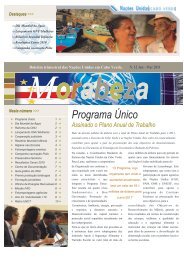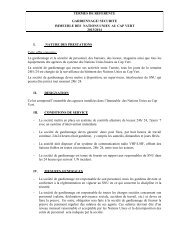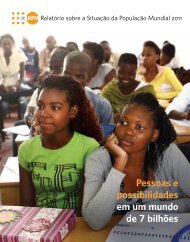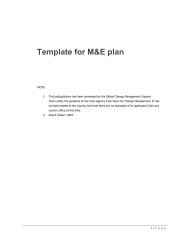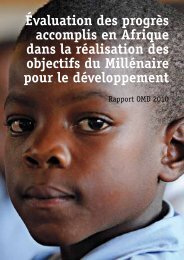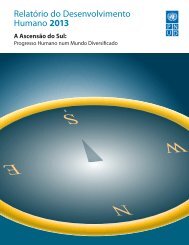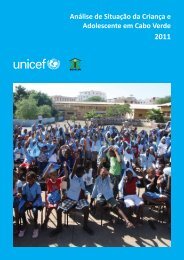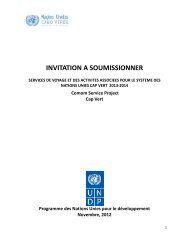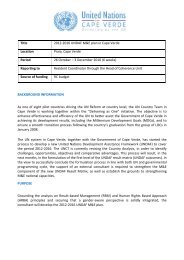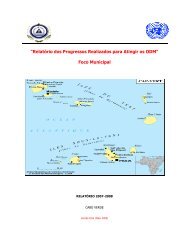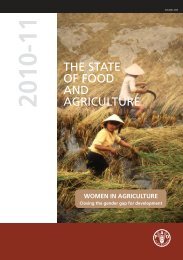FOCUS ONMigration and children: A cause for urgent attentionAn official from the Ministryof Labour and Social Welfarein Thailand reviews a logbookof migrant workers and victimsof trafficking who havebeen officially repatriated tothe Lao People’s DemocraticRepublic.Today, it is estimated that approximately214 million migrants live outsidetheir countries of birth. This figureincludes 33 million young children andadolescents under the age of 20 whohave migrated either with their parentsor unaccompanied. There are also manyother children and adolescents whoare directly or indirectly affected bymigration, including those left in thecountry of origin when one or both oftheir parents emigrate.Figures from the recently created UnitedNations Global Migration Databaseshow that in industrialized countries,adolescents aged 10–19 account foraround 53 per cent of internationalmigrants under 20. Overall, however,developing countries tend to host agreater number of migrants under 20,of which around 68 per cent areadolescents aged 10–19.There are wide geographical variations in migration trends for young childrenand adolescents. For instance, migrants under the age of 20 constitute thelargest group of the total migrant population in Africa (28 per cent). Theyalso make up a substantial percentage of migrants in Asia and Oceania(20 per cent), the Americas (11 per cent) and Europe (11 per cent).A gender gap exists among the global migrant population under 20, with94 migrant girls for every 100 migrant boys. This trend is in line with theglobal gender balance for that age cohort. In industrialized countries, however,migrant girls outnumber boys, with 100 girls for every 98 migrant boysunder 20. This gap is sharply reversed in developing countries, with only80 migrant girls under 20 for every 100 boys of the same age.The risks of adolescent migrationYoung children and adolescents – especially those who are undocumented orhave been separated from their families – are particularly vulnerable to violationsof human rights and protection abuses directly or indirectly related tomigration and migration policies and regulation. The United Nations SpecialRapporteur on the Human Rights of Migrants has underscored the exceptionalvulnerability of children across the spectrum of migration. A fundamentalconcern is that young children and adolescents crossing borders may notbe entitled to the same protection and rights as those who reside in a givencountry, leaving them at greater risk of invisibility, discrimination and exploitation.And while it is often reported that many migrants are not necessarilyamong the poorest in their countries of transit or destination, it is also truethat they often disproportionately face discrimination and exclusion in theircountries of origin, transit or destination – or all three.The urgent need for a child and adolescent perspective inmigration policiesA rights-based approach to migration is urgently required to reinforce thesteady build-up of support and attention to migration issues at the internationaland national levels. This approach must begin by addressing the rootcauses of migration (e.g., poverty, inequality, discrimination, instability) inthe country of origin, and it should incorporate policies specifically targetedfor young children and adolescents, girls and young women, and vulnerablepopulations, including those left behind when family members migrate.The absence of a child and adolescent perspective in migration-relateddetention, deportation and repatriation policies, and in fulfilling the economic,social and cultural rights of children is widely evident in both industrializedand developing countries. Urgent action is required to ensure that migrationpolicies meet the principles of the Convention and other human rights treatiesand that, in all cases, the best interests of the child are paramount.Encouragingly, across the world, governments and their partners are increasinglyworking on research, policies and programmes aimed at promotingand protecting the rights of children and adolescents affected by migration.Though much more remains to be done, the examples that follow illustratewhat can be achieved when political will is combined with adequateresources and sound strategies.• In the Philippines, the Government has devised policies and institutionssuch as the Overseas Workers Welfare Administration, which managesa trust fund that supports health care, welfare assistance education andtraining programmes for migrant workers and families. The PhilippinesOverseas Employment Administration is also working to protect the rightsof migrants and of families left behind.• In Mexico, the National Family Development System (NFDS) and the NationalMigration Institute (NMI) jointly operate eight care units in northernborder states to provide essential services, rest and communication withfamilies for repatriated children. In conjunction with non-governmentalorganizations, the NFDS also provides a network of 27 transitory sheltersto protect unaccompanied children and adolescents. A special corps ofchild protection officers, currently numbering over 300, has been establishedwithin the NMI since 2008; the corps has recorded higher rates ofdetection of and response to trafficking, sexual exploitation and violenceand abuse against these children.• In Albania, a programme launched by the Government and the UN, andsupported by Spain’s Millennium Development Goals Achievement Fund,aims to provide job opportunities and streamline national strategies foryouth employment and migration. Through labour programmes targetingat-risk youth, this programme specifically aims to reach youth employeesin two regions, Shkodra and Kukes, which are characterized by high levelsof informal employment and youth migration. In addition, it seeks tofoster ties between communities of origin and expatriate Albanians,using social media and web-based tools.See References, page 78.56THE STATE OF THE WORLD’S CHILDREN 2011
sentencing wherever possible, including counselling, probationand community service, as well as restorative justicethat involves the child, family, community and victim andpromotes restitution and reconciliation. 22 The ultimate aimmust always be that of reintegration, of encouraging youngpeople towards responsible citizenship.Conflict and emergency settingsA lack of peace and security exacerbates thedifficulties of growing into adulthoodConflict is one situation of violence that has clear andunequivocal risks for all adolescents. Although they arenot as vulnerable as young children to death and diseaseproduced by conflict, this group is at greater risk in otherways. Adolescents may be targeted for recruitment bymilitary groups, whether to carry weapons and participatein atrocities or to act in effect as sexual and other types ofslaves. Although the activities may involve violence, adolescentsmay also become involved because of their growinginterest in actively participating in politics.In emergencies, adolescents, particularly girls, are oftenforced to discontinue their education, owing to disruption,economic considerations or because they have to carefor younger siblings in the absence of parents. They mayADOLESCENT VOICESStriving for equity:A look at marginalized adolescents in Zambiaby Cian McLeod, 17,Ireland“Girls who aredisabled run agreater risk ofphysical andmental abuse.”Although I believe we are closer than ever to living inan equitable world, societies must still work towardschanging social norms that allow discrimination, marginalizationand exclusion. This is most apparent whenwe consider disabled children, girls’ education andchildren living with HIV.In November 2009, I had the opportunity to volunteerfor a couple of weeks in a home for disabled children inMongu, Zambia, and I gained a vivid insight into theirlives. I was shocked by the marginalization of thesechildren, as they are among the most cheerful andplayful I have ever met. As in many other countries,disabled children in Zambia are sometimes sent awayand even disowned. They may be left unattended anduncared for; they may also receive less food.Disabled children are often excluded from schoolbecause the education system makes no allowance forthem. In addition, their parents do not recognize theirright to education or development. They are deniedthe chance to learn the skills they need to work andachieve independence as adults.Gender inequality is evident as well. Girls who are disabledrun a greater risk of physical and mental abuse.Girls are not valued, and neither is their education. Isee the rise in HIV and AIDS as a direct result of thissocial outlook.Education plays a vital role in the prevention of sexualtransmitted infections. In order to halt the spread ofHIV, it is fundamental that all adolescents learn aboutprevention and treatment. Although school enrolmentof girls has increased in developing countries, it is stillnot equal to that of boys. In Zambia, when a familymember is HIV-positive, the family’s financial resourcesshift from education to health. As girls are responsiblefor the traditionally female tasks – cooking, cleaningand nursing – they are expected to drop out of schoolto care for the sick.Globally, nearly 5 million young people were living withHIV in 2008. In Zambia, if a girl or boy is thought to beinfected with HIV, she or he is no longer sent to school.This lack of education leads to a vicious cycle of genderinequality, increased HIV infection and poverty. Whengirls and women are not given access to education,they cannot gain independence from men; when girlsdo not learn about HIV prevention, they are more likelyto be exposed to the virus.It is evident that we do not yet live in a fair andnon-discriminatory world: The rights of marginalizedchildren need to be better protected. It is the responsibilityof adolescents to focus our endeavours towardscreating a more equitable society in our lifetime.Cian McLeod lives in Balbriggan, Ireland. He is involved inhis community’s sports development programme and peermentoring. His experience volunteering in Mongu waswith the Sporting Fingal Zambian Mission. Cian’s goal is towork as an economist for developing countries. He wouldlike to make the world a fairer place.GLobal challenges for adolescents 57
- Page 2 and 3:
© United Nations Children’s Fund
- Page 4 and 5:
AcknowledgementsThis report was pro
- Page 7 and 8:
THE STATE OF THE WORLD’S CHILDREN
- Page 9:
GLobal challenges for adolescents 1
- Page 12 and 13:
large cohort of unemployed youth, w
- Page 14 and 15: FOCUS ONEarly and late adolescenceR
- Page 16 and 17: ment and active participation. Disa
- Page 18 and 19: age at which individuals are legall
- Page 20 and 21: the rights of adolescents or to pro
- Page 22 and 23: The Convention was sufficiently ins
- Page 24 and 25: Adolescents are often consideredthe
- Page 26 and 27: HALLENGES ANDRealizing the rights o
- Page 28 and 29: FOCUS ONDemographic trends for adol
- Page 30 and 31: country are particularly serious, g
- Page 32 and 33: Gathering accurate data on adolesce
- Page 34 and 35: sexes, there is still a considerabl
- Page 36 and 37: PERSPECTIVEFacing the challenge:Rep
- Page 38 and 39: FOCUS ONInequality in childhood and
- Page 40 and 41: ADOLESCENT VOICESAct responsibly:Nu
- Page 42 and 43: past decade, though not all of them
- Page 44 and 45: Yet other initiatives against child
- Page 46 and 47: PERSPECTIVEChernobyl 25 years later
- Page 48: Adolescents are deeply concernedabo
- Page 51 and 52: OPPORTUNITIESrisk of climate change
- Page 53 and 54: Poverty, unemploymentand globalizat
- Page 55 and 56: PERSPECTIVEThe effects of climate c
- Page 57 and 58: high-level competencies that are in
- Page 59 and 60: a window for possible economic deve
- Page 61 and 62: ADOLESCENT VOICESReclaim Tijuana:Pu
- Page 63: are exacerbating those risks, inclu
- Page 67 and 68: e stranded in poverty by conflict o
- Page 70 and 71: HALLENGES ANDOver the course of the
- Page 72 and 73: gated by age, disability, sex, ethn
- Page 74 and 75: FOCUS ONPreparing adolescents for a
- Page 76 and 77: the Ministry of Education, in colla
- Page 78 and 79: exactly ‘youth participation’ l
- Page 80 and 81: spaces as part of Aprendiz, the ‘
- Page 82 and 83: PERSPECTIVEAdolescent girls:The bes
- Page 84 and 85: ADOLESCENT VOICESFrom victims to ac
- Page 86 and 87: ReferencesCHAPTER 11United Nations,
- Page 88 and 89: 19United Nations Children’s Fund,
- Page 90 and 91: STATISTICAL TABLESEconomic and soci
- Page 92 and 93: Under-five deaths (millions)Region
- Page 94 and 95: STATISTICAL TABLESapproach is not t
- Page 96 and 97: TABLE 1. BASIC INDICATORSCountries
- Page 98 and 99: TABLE 1. BASIC INDICATORSUnder-5mor
- Page 100 and 101: TABLE 2. NUTRITIONCountries and ter
- Page 102 and 103: TABLE 2. NUTRITIONCountries and ter
- Page 104 and 105: TABLE 3. HEALTHCountries and territ
- Page 106 and 107: TABLE 3. HEALTH% of populationusing
- Page 108 and 109: TABLE 4. HIV/AIDSCountries and terr
- Page 110 and 111: TABLE 4. HIV/AIDSEstimatedadult HIV
- Page 112 and 113: TABLE 5. EDUCATIONCountries and ter
- Page 114 and 115:
TABLE 5. EDUCATIONPrimary schoolNum
- Page 116 and 117:
TABLE 6. DEMOGRAPHIC INDICATORSCoun
- Page 118 and 119:
TABLE 6. DEMOGRAPHIC INDICATORSPopu
- Page 120 and 121:
TABLE 7. ECONOMIC INDICATORSCountri
- Page 122 and 123:
TABLE 7. ECONOMIC INDICATORSCountri
- Page 124 and 125:
TABLE 8. WOMENCountries andterritor
- Page 126 and 127:
TABLE 8. WOMENCountries andterritor
- Page 128 and 129:
TABLE 9. CHILD PROTECTIONChild labo
- Page 130 and 131:
TABLE 9. CHILD PROTECTIONChild labo
- Page 132 and 133:
Summary indicatorsAverages presente
- Page 134 and 135:
TABLE 10. THE RATE OF PROGRESSCount
- Page 136 and 137:
TABLE 10. THE RATE OF PROGRESSUnder
- Page 138 and 139:
TABLE 11. ADOLESCENTSCountries and
- Page 140 and 141:
TABLE 11. ADOLESCENTSAdolescents po
- Page 142 and 143:
TABLE 12. EQUITYCountries andterrit
- Page 144 and 145:
TABLE 12. EQUITYBirth registration
- Page 146 and 147:
AcronymsAIDSCEDAWDHSFGM/CGDPHIVIUCW
- Page 148:
United Nations Children’s Fund3 U



